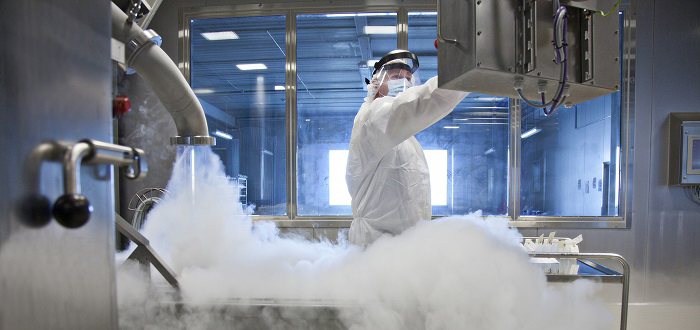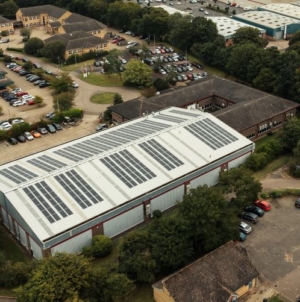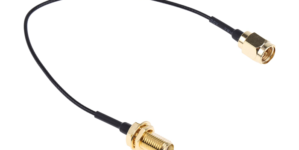-
Sparck Technologies awarded Royal designation - March 27, 2025
-
OpenADR Alliance announces first OpenADR 3.0 certified products with EVoke Systems, E.ON Energy and Universal Devices - March 25, 2025
-
Growing fulfilment and contract packer appoints new Managing Director - March 25, 2025
-
When is it time to invest in a WMS? Understanding the key trigger points - March 25, 2025
-
eCapital helps Vantage Recruitment on its journey to financial success - March 24, 2025
-
Hugo Beck Celebrates 70 Years of Packaging Innovation with Open House Events - March 20, 2025
-
PROLOG FULFILMENT SUPPORTS LUNA DAILY’S COMMITMENT TO BETTER BODY CARE FOR ALL WOMEN - March 19, 2025
-
Motion Ventures launches largest-ever maritime tech fund at $100M to meet the industry’s new pace of adoption - March 18, 2025
-
ITD GLOBAL APPOINTS GROUP CHIEF REVENUE OFFICER - March 17, 2025
-
SURECAM TEAMS UP WITH ENTERPRISE FLEX-E-RENT FOR VEHICLE REPAIR & MAINTENANCE CONFERENCE - March 14, 2025
Reliable even at extremely low temperatures: Blickle supplies Scandinavian biotech company with cold-resistant special castor wheels.
For use at temperatures down to -60 °Celsius, the wheel and roller specialist Blickle has developed a special solution for a Scandinavian biotechnology company: The castor wheels have stainless steel ball bearings and are lubricated with a special cold grease. This means that the manufacturer can reliably and effortlessly transport its sensitive products for the food industry and medical technology, even in freezing temperatures, in cage trolleys.
Temperatures below freezing are always a special challenge for man and technology – intralogistics is no exception. The severe conditions are often noticeable even in components that appear to be hardly susceptible at first glance. Wheels and rollers, for example: The ambient temperature has a great influence on the functionality and service life of these components. Among other things, extreme cold reduces the load bearing capacity and increases the brittleness of plastics used in the wheel treads. The movable housing parts must also be designed for low temperatures, for example by selecting a suitable lubricant. Otherwise, the result will be malfunctions, breakdowns and expensive maintenance work.
The combination of extreme cold and long idle times is bad for rollers
This is something that a Scandinavian biotech company – a world market leader in the life sciences sector with almost 3,000 employees and produces natural additives for the food industry, agriculture and medicine – has experienced first hand. The sensitive products are manufactured in a strictly controlled environment and must in some cases be cooled down to -60 °Celsius. This is done in specially designed cold storage rooms, where the goods are stored on cage trolleys – in some cases for several months. For the castor wheels on the trolleys, this makes tough going: They must therefore not only endure long idle times in extreme cold, but also cope with the large differences between the individual temperature zones during transport.
In the past, the company regularly had problems with such wheels. Brittle and fragile tyres, and stiff and corroded swivel housings led to outages and meant that trolleys were either barely used or not at all operable. This made handling harder for employees, reduced process efficiency and increased maintenance costs. The biotech producer was therefore looking for a better solution – and came across Blickle: The international wheel and roller specialist headquartered in Rosenfeld, Baden-Württemberg, Germany, with a range of around 30,000 items, and is competent partner in the planning, design and manufacture of customised products. The wheel and roller specialists from Blickle’s Danish subsidiary analysed the requirements of the Scandinavian company in detail on site and developed an ideal solution.
Stainless steel housing and cold-resistant lubricant
Now a castor roller based on the Blickle LIX-POTH series is used. Its high-quality housing is made of stainless chromium-nickel steel and is fixed to the cage trolley via a screw-on plate. The swivel head also contains stainless steel ball bearings and a robust centre bolt. The special feature: The grooved ball bearings of the wheel and the slewing ring of the swivel housing are lubricated with a special cold grease for roller bearings, which is suitable for temperatures down to -70 °Celsius. This means the moving parts are optimally protected and work reliably even in extreme cold.
The wheel from the POTH series, which is fitted in the castor, consists of a heavy polyamide body with a thermoplastic polyurethane tyre. The POTH wheel, which offers an excellent performance even in extreme cold, also has low rolling and swivel resistance, is quiet-running, protects floorings and does not leave marks on the floor. It is therefore perfect for use in such a sensitive production environment of the biotech manufacturer.
No air gaps during lubrication
The future application also demanded special care in the manufacture of the rollers. During production, Blickle takes great care to ensure that no air bubbles are created when introducing the lubricating grease. Otherwise, the transition between the extreme cold and temperatures above zero could result in the formation of condensation there. Upon re-entry into the freezer area, this condensation would freeze, impairing the function of the wheels and causing increased wear. It was possible, however, for Blickle to completely exclude this risk during manufacture.
This solution has already proven itself in practice. The biotech manufacturer subjected the new wheels to extensive tests – with successful results. These were much more resilient, functioned better and broke down less often under the adverse conditions than the previously used competitor product. The company therefore decided to permanently adopt the wheels.
































